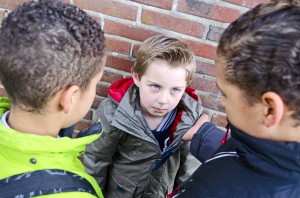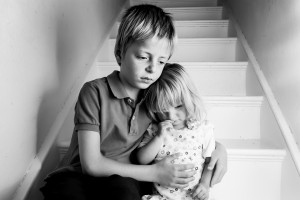
Psychotic experiences such as hearing voices have classically been viewed as representative of severe forms of mental illness. However, recent research has begun to suggest that low level psychotic phenomena may be more common than previously thought (van Os et al. 2008). These experiences are mainly transitory, resolving in between 75-90% of cases.
Psychotic symptoms are also common in mental disorders previously classified as non-psychotic, for example mood disorders (Kelleher et al. 2011).
The development of these symptoms is known to be associated with exposure to trauma; for example childhood bullying or abuse (Kelleher et al. 2013). The presence of dose-response relationships and cessation of psychotic phenomena on removal of trauma suggests a causative relationship.
What is unclear is the mechanism linking childhood experience and psychotic phenomena; not all children exposed to abuse will go onto develop psychotic symptoms for example.
To increase understanding in this area, recent research published in the British Journal of Psychiatry seeks to explore further the interplay of risk factors; adverse life events, childhood adversity and cannabis use with the development of low-level psychotic experiences (Morgan et al. 2014).

This study explores the impact of childhood adversity and negative life events on the experience of psychotic phenomena
Methods
The authors made use of a cross-sectional study design to address their hypotheses:
- Childhood adversity, life events and cannabis would be associated singly and cumulatively with psychotic experiences
- Childhood abuse would combine synergistically with
- Life events
- Cannabis use
Participant interviews
- Participants were recruited from households within the target area (South East London) and involved all household residents aged 16 or older
- Computer-assisted face to face interviews were used to collect data
- The psychosis screening questionnaire (a standardised measure) was used to screen for psychotic experiences. It assessed:
- Thought disorder
- Paranoia
- Strange experiences
- Hallucinations
- Questions were asked relating to childhood experiences of physical and sexual abuse
- Sociodemographic and socioeconomic information were gathered
- Previous illicit substance and cannabis use was recorded
- Symptoms of common mental disorder were recorded, using a structured clinical interview schedule
Data analysis
Participants who reported a past diagnosis of psychotic disorder were excluded from the analysis.
To assess their hypotheses, the authors initially used a logistic regression approach to explore the relationship between childhood adversity, life events and cannabis use with psychotic experiences. Remaining data were used as possible confounding variables.
They also tested for an additive synergistic interaction between childhood abuse and life events or cannabis use; that is, do those exposed to both childhood abuse and cannabis use experience a greater risk of psychotic events than the sum of risks for those exposed to childhood abuse and cannabis use alone?
Results: the risk of psychotic experiences
- In total, after exclusion for missing data and previous psychotic disorder diagnosis, the authors had access to data for 1,680 participants (mean age 39, 44% men)
- 17.9% of participants described psychotic experiences in the past year
- Paranoia was the most commonly endorsed experience (13.2%)
- Factors associated with increased psychotic experiences included:
- Young age (16-29 years vs 30+ years)
- Ethnicity (Other than White British)
- Unemployment
- Any common mental disorder (mixed anxiety/depression, depression or anxiety)
- University level education was associated with a decrease in risk for psychotic experience
- Cannabis use in the past year, but not prior, was associated with an increased risk for psychotic experience

Nearly 1 in 5 participants described psychotic experiences and adverse life events were nearly universal
Childhood abuse
- Psychotic experiences were associated with:
- Physical abuse: Odds ratio (OR) 2.17 (95% confidence interval (CI) 1.62 to 2.89)
- Sexual abuse: OR 2.13 (95% CI 1.28 to 3.56)
- Physical and sexual abuse: OR 3.24 (95% CI 1.68 to 6.25)
Life events
- Nine life events were measured for and at least one was endorsed by 89% of participants, with 25% reporting at least one event in the past year
- Life events associated with an increased rate of psychotic experiences, if ever experienced:
- Separated from partner
- Loved one died
- No money for rent
- Been in serious accident
- Witnessed violence
- Victim of crime
- Attacked
- Injured with weapon
- Life events associated with increased risk of psychotic experiences, if exposure occurred in the past year:
- Separated from partner
- Loved one died
- Been in serious accident
- Attacked
- There was a linear association between the number of events experienced and the risk of psychotic experiences:
- Each event ever experienced added an additional OR 1.45 (95% CI 1.32 to 1.59)
- Each event experienced in the past year added an additional OR 1.7 (95% CI 1.44 to 2.00)
Synergistic interactions
- There was statistically significant evidence of an additive synergistic interaction between childhood abuse and experienced life events
- Cannabis use in the past year and past childhood abuse interacted with a suggestion of synergism, but this was not statistically significant

There was evidence of a synergistic interaction between childhood abuse and negative life events
Conclusions
The authors conclude:
Our findings are consistent with the hypothesis that childhood abuse creates an enduring vulnerability to psychosis that is realised in the event of exposure to further stressors and risk factors.
Discussion
This paper adds additional evidence for the interaction between childhood abuse, adverse life events and psychotic experience. Being a cross-sectional design it cannot demonstrate causation and further study, as always, is required to explore the nature of these observations in further detail.
The study is also limited by its superficiality – for example the nature of the alleged psychotic phenomena has not been explored in detail and in relation to endorsed life events; the most commonly endorsed experience (paranoia) could be seen as appropriate after one has been injured with a weapon for instance? Similarly the amount of cannabis use and impact of psychotic phenomena on personal life remains unexplored here.
Despite these limitations this study serves as further support of the need for detailed consideration of life events during clinical assessment, as their presence, and likely the individual’s interpretation of this experience, are related to the experience of psychotic phenomena.

Enquiring about childhood experiences and negative life events is a crucial part of all clinical assessments
Links
Morgan C, Reininghaus U, Reichenberg A, Frissa S; SELCoH study team, Hotopf M, Hatch SL. Adversity, cannabis use and psychotic experiences: evidence of cumulative and synergistic effects. Br J Psychiatry. 2014 May;204:346-53. doi: 10.1192/bjp.bp.113.134452. Epub 2014 Mar 13.
van Os J, Linscott RJ, Myin-Germeys I, Delespaul P, Krabbendam L. A systematic review and meta-analysis of the psychosis continuum: evidence for a psychosis proneness-persistence-impairment model of psychotic disorder. Psychol Med. 2009 Feb;39(2):179-95. doi: 10.1017/S0033291708003814. Epub 2008 Jul 8. [PubMed abstract]
Kelleher I, Harley M, Murtagh A, Cannon M. Are screening instruments valid for psychotic-like experiences? A validation study of screening questions for psychotic-like experiences using in-depth clinical interview. Schizophr Bull. 2011 Mar;37(2):362-9. doi: 10.1093/schbul/sbp057. Epub 2009 Jun 19.
Kelleher I, Keeley H, Corcoran P, Ramsay H, Wasserman C, Carli V, Sarchiapone M, Hoven C, Wasserman D, Cannon M. Childhood trauma and psychosis in a prospective cohort study: cause, effect, and directionality. Am J Psychiatry. 2013 Jul 1;170(7):734-41. doi: 10.1176/appi.ajp.2012.12091169. [PubMed abstract]


RT @Mental_Elf: Childhood abuse & adverse life events interact synergistically to produce high risk for psychotic experiences http://t.co/n…
Childhood abuse and adverse life events interact synergistically to produce a high risk for psychotic experien… http://t.co/e48uyPsuLR
@Mental_Elf finally,some’proof’of whatclinicians& their patientshave know& been battling for years!
Dave JH liked this on Facebook.
Lydia Watson liked this on Facebook.
Childhood #abuse and adverse life events interact synergistically to produce a high risk for psychotic experiences http://t.co/20jqUfzf0g
Today @shrinking81 blogs about adversity, cannabis use & psychotic experiences http://t.co/jDAGPeMb3q
http://t.co/ef6iLIoaGE
Cross-sectional study finds that 17.9% of participants (general public) had psychotic experiences in the past year http://t.co/jDAGPeMb3q
@Mental_Elf Also people with psychosis may have biased recall regarding adverse events.
Marianne Scarfo liked this on Facebook.
The Mental Elf liked this on Facebook.
Childhood abuse and adverse life events interact synergistically to produce a high risk for psychotic experiences http://t.co/iRDme8YpAN
New study finds cannabis use in past year, but not prior, is associated w/ increased risk for psychotic experience http://t.co/jDAGPeMb3q
New blog by adverse childhood events leave enduring risk for psychosis (NB more impt than cannabis use) http://t.co/lJuKPNPNVs
@shrinking81 @Mental_Elf
17.9% of participants had #psychotic experiences in the past year, with #paranoia most common. (Morgan et al, 2014)
http://t.co/BrgSn1AahU
Mental Elf: Childhood abuse and adverse life events interact synergistically to produce a high risk for psychotic… http://t.co/7TpVhu1759
Psychotic experiences assoc w/ physical abuse (OR=2.17), sexual abuse (OR=2.13), physical & sexual abuse (OR=3.24) http://t.co/jDAGPeMb3q
Abuso infantil y acontecimientos vitales adversos interactúan de forma sinérgica produciendo mayor riesgo de psicosis
http://t.co/k2PJHytpJN
Rebecca Griffiths liked this on Facebook.
Lynnelle Renee’ liked this on Facebook.
Julie Gosselin liked this on Facebook.
RT @Mental_Elf: Enquiring about childhood experiences and negative life events is a crucial part of all clinical assessments http://t.co/jD…
Don’t miss: Childhood abuse & adverse events interact synergistically to produce high risk for psychotic experiences http://t.co/jDAGPeMb3q
RT @SimonSRN: Childhood abuse and adverse life events and risk for psychotic experiences http://t.co/7q8pnn2MK0 @mental_elf
RT @shrinking81: My blog for @Mental_Elf on childhood adversity, negative life experiences and risk psychosis experiences http://t.co/xsd5F…
http://t.co/PARfhpAg06 #mentalhealth
Carina Kirby liked this on Facebook.
Childhood abuse and adverse life events interact synergistically to produce a high risk for psychotic experiences. http://t.co/LQD2ImmgPY
A recent study concludes that childhood abuse creates an enduring vulnerability to psychosis. http://t.co/hA6G3moB2O
In the news: Adverse life events and the risk of psychotic experiences – via @Mental_Elf http://t.co/naxku6FzBY
“Adverse life events and the risk of psychotic experiences – The Mental Elf” http://t.co/xp5yVEFEKB < risks from childhood abuse
Adverse life events and the risk of psychotic experiences – http://t.co/9Naj2BTaAT
hearing voices of itself is not a “psychotic experience” but something that might be experienced in psychosis.
Even DSM has 49 categories that include hearing voices others don’t [or AH as they term it].
In one study 66% of Spanish medical students said they have heard voice[s] others didn’t
In another study [slmost] 50% of people in long term marriage reported they heard, saw, or otherwise sensed the presence of their deceased spouse.
Q. are 50% of married people and 66% of Spanish Doctors “psychotic”?
And what of cultures in which its teh peopl ewho don’t hear voices [and talk about ot] who are regarded as troubled.
Your reality tunnel is not the only one.
Unless you want to perpetrate stereotypes and the discrimination that arises from them you will need to take more care with your words.
Juan Francisco Flores liked this on Facebook.
Juan Francisco Flores liked this on Facebook.
Carina Kirby liked this on Facebook.
Rebecca Griffiths liked this on Facebook.
Lynnelle Renee’ liked this on Facebook.
Julie Gosselin liked this on Facebook.
Marianne Scarfo liked this on Facebook.
The Mental Elf liked this on Facebook.
Dave JH liked this on Facebook.
Lydia Watson liked this on Facebook.
[…] A. (2014). Childhood abuse and adverse life events interact synergistically to produce a high risk for psychoti…. The Mental Elf, 15 Jul […]